This past spring, The FruitGuys Community Fund selected 17 small farms and agricultural nonprofits from 11 different states to receive a total of $71,136 in grants for farm projects that advance environmental and economic health. The majority of funds were directed to farms owned or led by Black Indigenous People Of Color (BIPOC) women, furthering our goal of providing critical support to under-represented farmers. Generous program sponsorship from Aramark, the Philadelphia-based food and facilities service provider, supported a group of non-profit BIPOC farms this round. We’ve just received interim project updates from the grantees. Here’s stories of the successes and challenges they’ve had so far implementing their projects.
Interim Project Updates
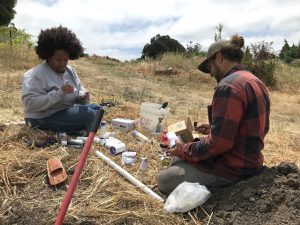 Agroecology Commons is a 1-acre agricultural nonprofit in El Sobrante, CA that grows seasonal vegetables. They received a $4,918 grant to enhance their water conservation practices by installing drip irrigation, adding bee hives for pollination, and building a hoop house to extend their growing season.
Agroecology Commons is a 1-acre agricultural nonprofit in El Sobrante, CA that grows seasonal vegetables. They received a $4,918 grant to enhance their water conservation practices by installing drip irrigation, adding bee hives for pollination, and building a hoop house to extend their growing season.
So far, they have installed two beehives; one Langstroth hive, a design that’s easier on the beekeeper’s back, and one Warré-style hive, a setup that is said to mimic bee life in the wild. In addition, they are designing and building their drip irrigation system, which they hope to complete soon. Both projects are part of their Bay Area Farmer-to-Farmer training program, which helps beginning farmers to gain skills and knowledge in agroecology. Farm Director Brooke Porter told us, “[this year there’s] 42 BIPOC and gender marginalized beginning farmers participating in the program.”
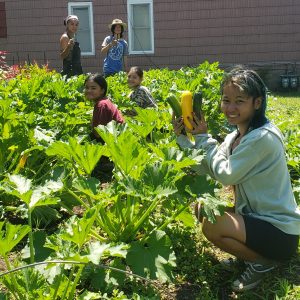 5 Loaves Farm, a 1-acre agricultural nonprofit in Buffalo, NY, provides sustainably-grown fruit, vegetables, honey, and maple syrup to residents and opportunities for local youth, immigrants, and refugees to work and grow food. They received a $4,998 grant to increase their sustainability by improving soil health, replacing sprinklers with drip irrigation, extending their growing season with a new hoop house, installing pollinator plantings, and subsidizing several CSA shares for at-risk youth interns and their families.
5 Loaves Farm, a 1-acre agricultural nonprofit in Buffalo, NY, provides sustainably-grown fruit, vegetables, honey, and maple syrup to residents and opportunities for local youth, immigrants, and refugees to work and grow food. They received a $4,998 grant to increase their sustainability by improving soil health, replacing sprinklers with drip irrigation, extending their growing season with a new hoop house, installing pollinator plantings, and subsidizing several CSA shares for at-risk youth interns and their families.
5 Loaves has installed berry trellises, pollinator plantings, and drip irrigation to their existing hoop houses. They have also procured the compost, silage tarps, and caterpillar tunnel that they hope to install in November. Farm Director Matt Kauffman also told us they used part of their funding for subsidized CSA shares for the families of 14 educational interns and two additional families. One of their goals is to have members of these communities lead the farm. Kauffman said, “we’ve been very pleased with the progress we’ve seen so far this year, and the relationships made through being able to offer subsidized CSA shares with the funding you provided, have been the key to that progress.”
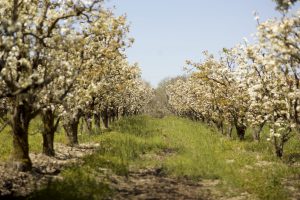 EARTHseed Farm, a certified-organic, solar-powered 14-acre agricultural nonprofit in Sebastopol, CA, grows apples, pears, persimmons, plums, pluots, guavas, mixed berries, herbs, and flowers. They operate and are rooted in Afro Indigenous permaculture principles built on the long legacy of earth wisdom traditions of people of African descent. They received $4,970 to install a rainwater catchment system they expect will provide up to 1,000 gallons of water each year that they will use to irrigate their orchard and become part of educational tours.
EARTHseed Farm, a certified-organic, solar-powered 14-acre agricultural nonprofit in Sebastopol, CA, grows apples, pears, persimmons, plums, pluots, guavas, mixed berries, herbs, and flowers. They operate and are rooted in Afro Indigenous permaculture principles built on the long legacy of earth wisdom traditions of people of African descent. They received $4,970 to install a rainwater catchment system they expect will provide up to 1,000 gallons of water each year that they will use to irrigate their orchard and become part of educational tours.
EARTHseed was pleased to report that they have a dedicated team member working on the installation of their rainwater system. They look forward to sharing more information and photos in the coming months.
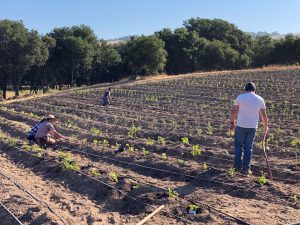 Farm to Fight Hunger, a 2-acre agricultural nonprofit in Healdsburg, CA, donates 100% of everything it grows to fight food insecurity in Sonoma County. They grow culturally-relevant varieties of vegetables, including tomatoes, tomatillos, peppers, squash, corn, onions, broccoli, cauliflower, kale, nopales, and Mexican and South American herbs. Having converted an acre of vineyard to vegetable production, they received a $4,755 grant to plant a 300-foot-long hedgerow of native, drought-tolerant plants, fruit, and nut trees to create a habitat for pollinators and other beneficial insects.
Farm to Fight Hunger, a 2-acre agricultural nonprofit in Healdsburg, CA, donates 100% of everything it grows to fight food insecurity in Sonoma County. They grow culturally-relevant varieties of vegetables, including tomatoes, tomatillos, peppers, squash, corn, onions, broccoli, cauliflower, kale, nopales, and Mexican and South American herbs. Having converted an acre of vineyard to vegetable production, they received a $4,755 grant to plant a 300-foot-long hedgerow of native, drought-tolerant plants, fruit, and nut trees to create a habitat for pollinators and other beneficial insects.
Founder and farmer Bruce Mentzer told us they have the equipment, materials, and site ready for installation. Conscious of the drought conditions, they will be planting the hedgerow this fall, just ahead of a hopefully rainy season.
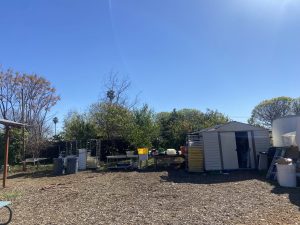 Huerta del Valle is a 10-acre agricultural nonprofit in Ontario, CA, that provides community farming plots and a CSA to distribute the fruits, vegetables, and herbs grown there if farmers choose to do so. They received $4,037 to upgrade their produce processing and cleaning station, which will help conserve water, reduce waste, and improve food safety, providing an educational model for emerging farmers. In addition, the shaded area will provide a community gathering area for growers, volunteers, and visitors.
Huerta del Valle is a 10-acre agricultural nonprofit in Ontario, CA, that provides community farming plots and a CSA to distribute the fruits, vegetables, and herbs grown there if farmers choose to do so. They received $4,037 to upgrade their produce processing and cleaning station, which will help conserve water, reduce waste, and improve food safety, providing an educational model for emerging farmers. In addition, the shaded area will provide a community gathering area for growers, volunteers, and visitors.
Project Director Tracey Kimura told us a local business donated a sink with missing legs that a community member was able to repair and they will allocate grant funds to repair the dry storage room floor, which broke during the grant period, and purchase materials for a shaded gathering area.
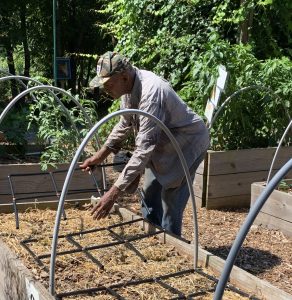 Urban Food Forest at Brown Mill Community Garden is a 1-acre agricultural nonprofit located in a food desert within Atlanta, GA, that grows a variety of greens, fruit, beans, herbs, and flowers for neighborhood residents. They received a $3,581 grant to upgrade their watering system with pre-fabricated irrigation grids for 30 of their 39 raised planting beds to conserve water, conserve soil, and improve productivity.
Urban Food Forest at Brown Mill Community Garden is a 1-acre agricultural nonprofit located in a food desert within Atlanta, GA, that grows a variety of greens, fruit, beans, herbs, and flowers for neighborhood residents. They received a $3,581 grant to upgrade their watering system with pre-fabricated irrigation grids for 30 of their 39 raised planting beds to conserve water, conserve soil, and improve productivity.
Garden Manager Rosemary W. Griffin told us that after a supply chain delay, they have received their irrigation grids and have started installation. “We are excited about having them installed in time for our fall garden.” These grid systems will provide more efficient, consistent watering, which will help cut down on labor and improve production.
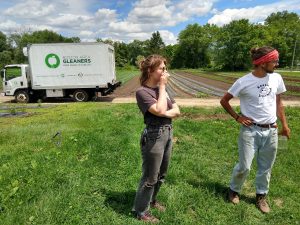 Stonefield Farm of Boston Area Gleaners is a 25-acre agricultural nonprofit in Acton, MA, on land that has been farmed for nearly 100 years. Boston Area Gleaners recently purchased the farm to further its mission to support an equitable, just, and sustainable local food system. They received a $4,931 grant to purchase and plant native hydrophilic trees, including willows and red maples, to absorb excess water in poor drainage areas. In addition, native pollinator plants that thrive in a wet environment will complement the area.
Stonefield Farm of Boston Area Gleaners is a 25-acre agricultural nonprofit in Acton, MA, on land that has been farmed for nearly 100 years. Boston Area Gleaners recently purchased the farm to further its mission to support an equitable, just, and sustainable local food system. They received a $4,931 grant to purchase and plant native hydrophilic trees, including willows and red maples, to absorb excess water in poor drainage areas. In addition, native pollinator plants that thrive in a wet environment will complement the area.
Development Coordinator Tessa Lance told us they have successfully added the pollinator plantings and will add the willow and maple plantings later this fall. Lance said, “Planting the trees will increase our growing capacity and therefore the number of people reached through our Hunger Relief work and Boston Food Hub.”
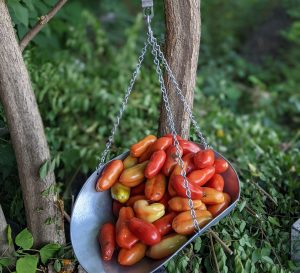 Cooperation Operation, a 2-acre agricultural nonprofit on the south side of Chicago, grows beans, squash, cucumbers, small fruits, peppers, tomatoes, okra, and herbs. The only farm in the area, their mission is to expand the local community’s access to practice sustainable agriculture in an urban context and consume locally-sourced produce. They received a $5,000 grant to purchase a shipping container and coolbot to process and store produce in a food-safe environment that allows them to increase the amount of donated produce.
Cooperation Operation, a 2-acre agricultural nonprofit on the south side of Chicago, grows beans, squash, cucumbers, small fruits, peppers, tomatoes, okra, and herbs. The only farm in the area, their mission is to expand the local community’s access to practice sustainable agriculture in an urban context and consume locally-sourced produce. They received a $5,000 grant to purchase a shipping container and coolbot to process and store produce in a food-safe environment that allows them to increase the amount of donated produce.
Cooperation Operation is making strides in implementing their new wash-pack station and walk-in cooler. Team member Olisaemeka Okakpu told us, “Originally we were going to build the wash-pack station and walk-in cooler in the same area, but after careful consideration, we believe it would be more advantageous for the wash-pack station to be closer to our main water source.”
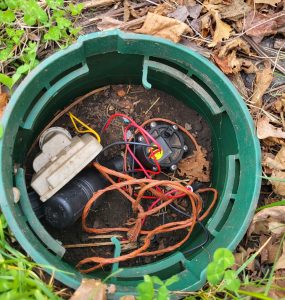 Costello Urban Farm is a 1-acre agricultural nonprofit in Lawrence, MA, that provides a year-round program that offers part-time, paid positions for local high school students to plan, grow, and harvest produce; lead local environmental and healthy community initiatives; and challenge their peers to do community service. The farm’s harvest is donated to local food banks or sent home to the youth’s families. They received a $2,800 grant to repair their broken drip irrigation system.
Costello Urban Farm is a 1-acre agricultural nonprofit in Lawrence, MA, that provides a year-round program that offers part-time, paid positions for local high school students to plan, grow, and harvest produce; lead local environmental and healthy community initiatives; and challenge their peers to do community service. The farm’s harvest is donated to local food banks or sent home to the youth’s families. They received a $2,800 grant to repair their broken drip irrigation system.
Costello Urban Farm has completed their project! Development Manager Megan Davis shared that they were able to upgrade and replace the irrigation timer systems around the farm with battery-powered timers, which will be compatible with a future solar system. They also completed other repairs to the irrigation system and moved irrigation housing. She said, “These upgrades have already had a significant positive impact by reducing the need for staff to be onsite to turn on/off the irrigation system and allowing consistent watering of garden beds improving productivity.” So far this year, they have donated 226 pounds of produce. They’ve also continued their high school employment and youth programming that promotes agricultural and environmental education.
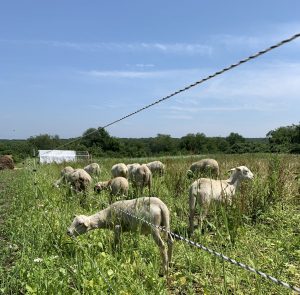 Movement Ground Farm is a 5-acre agricultural nonprofit in Tiverton, RI, that grows a wide variety of vegetables, with a special focus on crops catering to South East Asian and Chinese immigrants and refugees, as well as chickens for eggs and meat. They received a $4,741 grant to add 12 Katahdin lambs to their farm for grazing and meat. Lamb is relevant to many immigrant communities, and their CSA is the only one in Rhode Island with a majority BIPOC membership base.
Movement Ground Farm is a 5-acre agricultural nonprofit in Tiverton, RI, that grows a wide variety of vegetables, with a special focus on crops catering to South East Asian and Chinese immigrants and refugees, as well as chickens for eggs and meat. They received a $4,741 grant to add 12 Katahdin lambs to their farm for grazing and meat. Lamb is relevant to many immigrant communities, and their CSA is the only one in Rhode Island with a majority BIPOC membership base.
The flock of Katahdin lambs have arrived and Livestock Coordinator Julia Chang told us, “they grazed on an acre of buckwheat, tillage radish, and sorghum-sudangrass. No parasite issues or illnesses have been noticed and the sheep have been sizing up well.” However, the biggest challenge to their project has been shifting grazing plans for the lambs due to the severe drought occurring in the region. “We are supplementing their grazing with hay while seeding the original acre with cool season forages and waiting for it to grow in,” said Julia.
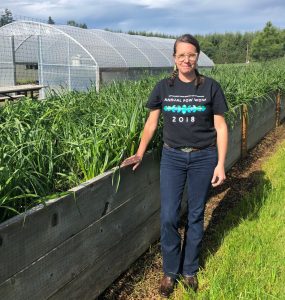 Sakari Farms is a 3-acre tribal food and education farm in Bend, OR. They received a $1,086 grant to build raised growing beds for a demonstration garden to grow Camas, Wapato, and Makah potatoes for harvest and educational purposes. These root-based native and traditional plants are a main food source, seasonal staple, and of high importance to ceremonial events and systems in the region.
Sakari Farms is a 3-acre tribal food and education farm in Bend, OR. They received a $1,086 grant to build raised growing beds for a demonstration garden to grow Camas, Wapato, and Makah potatoes for harvest and educational purposes. These root-based native and traditional plants are a main food source, seasonal staple, and of high importance to ceremonial events and systems in the region.
Despite daunting challenges of severe drought, high temperatures, and labor shortages, Skari Farms has purchased the supplies and gathered the materials needed for their new planting beds. They hope to build, fill, and plant the new beds in later September. Sakari’s Owner, Spring Alaska Schreiner, told us that they did have success “growing out the native strawberries and that the Makah Potatoes will be planted for seed crops for spring production.”
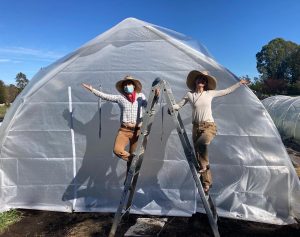 Red H Farm, a 2-acre farm in Sebastopol, CA, is grounded in the agroecological ethics of growing soil, conserving water, fostering biodiversity, cultivating community, and building equity. While the majority of their land is dry-farmed, climate change issues such as California’s ongoing drought, wildfires, and extreme heat have prompted them to expand the portion of the farm using drip irrigation. They received a $5,000 grant to expand their drip irrigation system to support production for their sliding-scale winter CSA program, establish perennial edible and pollinator-focused hedgerows, and a caterpillar tunnel.
Red H Farm, a 2-acre farm in Sebastopol, CA, is grounded in the agroecological ethics of growing soil, conserving water, fostering biodiversity, cultivating community, and building equity. While the majority of their land is dry-farmed, climate change issues such as California’s ongoing drought, wildfires, and extreme heat have prompted them to expand the portion of the farm using drip irrigation. They received a $5,000 grant to expand their drip irrigation system to support production for their sliding-scale winter CSA program, establish perennial edible and pollinator-focused hedgerows, and a caterpillar tunnel.
Owner and Operator Caitlin Hachmyer told us, “things are moving along wonderfully with our project.” Despite a few challenges, most of the irrigation system is up and running. They have used the 50-foot caterpillar tunnel, which is currently full of seedlings for their winter CSA, all season. They’ve also just completed a deer fence and will soon begin planting their hedgerows along it.
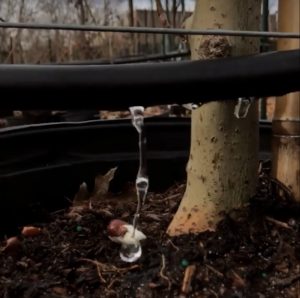
Philly Forests is a 3-acre farm in northwest Philadelphia, PA that uses sustainable and regenerative growing practices to produce greens, peppers, tomatoes, allium, plums, strawberries, blackberries, and herbs. They operate a philanthropic Urban Ecology Program where they use a percentage of crop revenue to purchase trees, shrubs, and perennials to distribute for free to residents living in Philadelphia’s lowest canopy areas, generally lower-income, BIPOC-populated neighborhoods. They received a $2,800 grant to establish an irrigation system in their tree and native plant nursery instead of watering by hand.
The installation was a success! Executive Director Jasmine Thompson told us, “positive outcomes include trees being watered more regularly and having more stability.” They have also hosted a number of community events highlighting the tree and plant nursery and water conservancy.
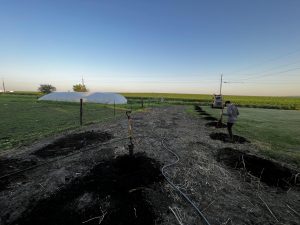 Over the Moon Farm & Flowers, a 4-acre farm in Coggon, IA, run by two young queer women farmers, grows cut flowers and humanely-raised chicken, turkey, pork, beef, and eggs sold through their CSA. They received a $5,000 grant to purchase electric poultry net fencing and the planting of trees, perennial flowers, and shrubs for a windbreak that will double as future habitat for their pasture-based poultry.
Over the Moon Farm & Flowers, a 4-acre farm in Coggon, IA, run by two young queer women farmers, grows cut flowers and humanely-raised chicken, turkey, pork, beef, and eggs sold through their CSA. They received a $5,000 grant to purchase electric poultry net fencing and the planting of trees, perennial flowers, and shrubs for a windbreak that will double as future habitat for their pasture-based poultry.
The poultry net fencing was installed and has already allowed them to expand their pastured poultry production. They have begun reaching out to local food organizations about providing free or low-cost pasture-raised turkeys for the holidays. They have also planted their spring perennials, and co-owners Anna Hankins and Shamane Pesek told us, “We are seeing the importance of having perennial trees and shrubs as part of our production system in order to protect our animals from the extreme heat and wind that we have experienced periodically throughout this summer.”
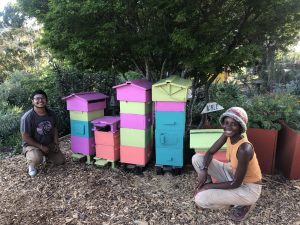 Soulflower Farm, a 2-acre organic-certified biodynamic permaculture farm in El Sobrante, CA, teaches herbal medicine and permaculture design. They received a $4,498 grant to establish a rainwater catchment system; improve their compost system; bring sheep and goats into their diversified farm to demonstrate a closed loop animal system; add ten beehives to add beekeeping to their BIPOC permaculture and beginning farmer trainings; and purchase 100 egg-laying chickens to use for integrated pest management in our fruit orchards and for sale of eggs.
Soulflower Farm, a 2-acre organic-certified biodynamic permaculture farm in El Sobrante, CA, teaches herbal medicine and permaculture design. They received a $4,498 grant to establish a rainwater catchment system; improve their compost system; bring sheep and goats into their diversified farm to demonstrate a closed loop animal system; add ten beehives to add beekeeping to their BIPOC permaculture and beginning farmer trainings; and purchase 100 egg-laying chickens to use for integrated pest management in our fruit orchards and for sale of eggs.
Soulflower has lots of new additions to the farm. Four Barbados sheep and a colony of bees have arrived so far. They also installed several large rainwater catchment tanks that are ready to go for the winter rains. Owner Maya Blow said that “all apprentices, volunteers, and folks renting plots on the farm are in love with the animals and will benefit from learning about water catchment as well as beekeeping and pollination!”
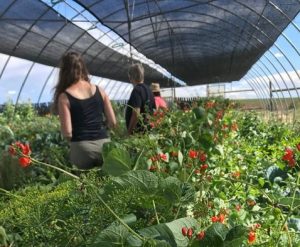 SongHaven Farm, is a 4-acre farm in Cahone, CO, that grows over 30 varieties of vegetables, herbs, flowers, and raises egg-laying chickens and dairy goats. The farm has seen increases in wind pressure over the last ten years, which has made growing more challenging, with soil temperatures staying cooler longer, plants suffering, and regular high tunnel damage. They received a $5,000 grant to build an energy-efficient underground greenhouse called a Walipini. These structures utilize passive solar design principles and upcycle materials for their construction.
SongHaven Farm, is a 4-acre farm in Cahone, CO, that grows over 30 varieties of vegetables, herbs, flowers, and raises egg-laying chickens and dairy goats. The farm has seen increases in wind pressure over the last ten years, which has made growing more challenging, with soil temperatures staying cooler longer, plants suffering, and regular high tunnel damage. They received a $5,000 grant to build an energy-efficient underground greenhouse called a Walipini. These structures utilize passive solar design principles and upcycle materials for their construction.
SongHaven purchased the material and supplies needed for the greenhouse frame. Owner and Farmer Michele Martz told us, “we made a change to the project because of inflation and went with a slightly different greenhouse kit than we originally intended in order to stay within budget.”
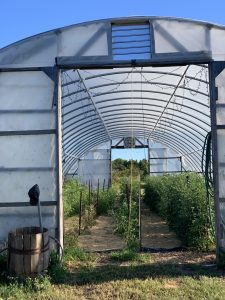 Carlson’s Island View Orchard is a fifth-generation farm in Sister Bay, WI. The first cherry trees were planted in 1915, and the farm offers a popular You-Pick program featuring fruit, strawberries, plums, tomatoes, and pumpkins. They received a $3,359 grant to replace their drip irrigation system, repair their hoop house, purchase strawberry and raspberry plants to diversify their crops, and establish native Mason bee colonies for pollination.
Carlson’s Island View Orchard is a fifth-generation farm in Sister Bay, WI. The first cherry trees were planted in 1915, and the farm offers a popular You-Pick program featuring fruit, strawberries, plums, tomatoes, and pumpkins. They received a $3,359 grant to replace their drip irrigation system, repair their hoop house, purchase strawberry and raspberry plants to diversify their crops, and establish native Mason bee colonies for pollination.
Carlson’s Island View Orchard has been working hard this summer planting new strawberry and raspberry patches, laying mulch and drip irrigation, installing hoop house fans, and beginning their hoop house repairs. They hope to host an event this fall to assemble and place the mason bee houses during their pumpkin harvest. Owner and farmer Anna Carlson-Krauel told us that one of the biggest challenges this year was balancing her pregnancy and farming, but the volunteer and customer enthusiasm was inspiring. She told us, “Without the help of community volunteers, we would not have been able to maintain our timeline. We are all very grateful for the community and excited for this 6th generation farmer to make her appearance soon.”
Ten Years of Small Grants with Big Impacts
By the Numbers
- 105 farms supported
- $412,000 awarded
- 32 states represented
- 1,367 acres stewarded
- 86% Women & BIPOC Farmers
- 52% Family Farms
Please consider supporting the 2023 grant cycle and help make a big impact on a small farm. 100% of your donation goes to the farms. Donate today.
These small farmers are striving to better their communities and protect the environment. The FruitGuys Community Fund is proud to support the 2022 grantees as they grow. Stay tuned for their end-of-the-year project updates and the start of our 2023 grant cycle, which opens in January. If you know a small farm or agricultural nonprofit, let them know about us! We’re excited to continue to assist those incredible small farmers making big impacts.




